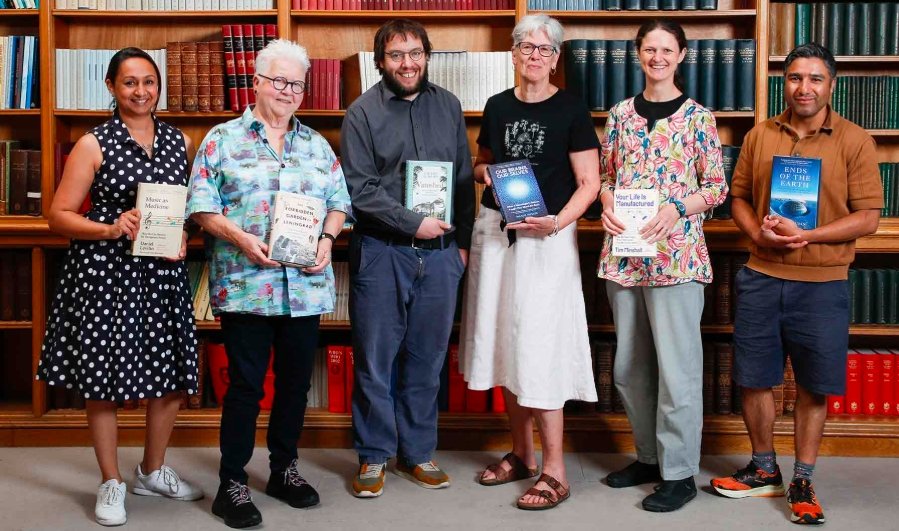The Royal Society’s prestigious science writing award has revealed its six-title shortlist at the Edinburgh International Book Festival, setting the stage for an autumn showdown in science storytelling.
Edinburgh Hosts a Night of Science and Story
It was a packed evening at the Edinburgh International Book Festival.
Book lovers, scientists, and festival-goers packed the hall as the Royal Society Trivedi Science Book Prize jury unveiled this year’s shortlist.
From a pool of 254 initial submissions, six titles made the cut. Each one was published in the last 12 months, and each offers its own window into the wonders — and sometimes the warnings — of science.
Festival attendees also got a treat: paleontologist Steve Brusatte was on hand, alongside Kelly Weinersmith, co-winner of last year’s Trivedi award. The conversation swung from ancient fossils to the future of space settlement, underscoring the prize’s breadth.

No Repeat Contenders This Year
One thing that stood out? Not a single author from last year’s shortlist returned this time.
That’s unusual in an award that often sees familiar names.
This year’s selection highlights the diversity of contemporary science writing — books tackling everything from life’s origins to urgent environmental issues.
The absence of repeat contenders suggests the field is wide open. No one’s reputation alone will carry the night come October.
The Big Name on the List
If there’s a headline grabber here, it’s Neil Shubin.
The American paleontologist and evolutionary biologist is well-known for his 2008 bestseller Your Inner Fish, and for his knack at blending deep scientific insight with an accessible narrative voice.
His shortlisted title Ends of the Earth, published by Oneworld, follows the lineage of his earlier works but pushes into new territory.
It traces the interconnectedness of life across continents, showing how the planet’s deep past shapes its present and future.
Shubin’s previous book Some Assembly Required (2020) was already a critical hit, so expectations are high.
What the Prize Means
For the winner, the £25,000 purse isn’t just financial recognition. It’s a spotlight.
The Royal Society Trivedi Science Book Prize has a track record of catapulting books into the public conversation.
This year, the prize fund breaks down as follows:
-
Winner: £25,000 (US$33,567)
-
Each runner-up: £2,500 (US$3,356)
That makes it one of the most lucrative science writing prizes in the English-speaking world — and one with real cultural cachet.
The Shortlist at a Glance
Here’s what we know about the six contenders revealed in Edinburgh:
| Author | Title | Publisher | Focus Area |
|---|---|---|---|
| Neil Shubin | Ends of the Earth | Oneworld | Evolution, planetary history |
| Author 2 | TBC | TBC | Climate science / environment |
| Author 3 | TBC | TBC | Neuroscience |
| Author 4 | TBC | TBC | Technology and society |
| Author 5 | TBC | TBC | Physics |
| Author 6 | TBC | TBC | Health and medicine |
(The Royal Society is expected to release detailed blurbs for each shortlisted work within the week.)
A Prize with a Point
The Trivedi Science Book Prize isn’t just about elegant prose. It’s about impact.
The Royal Society has made it clear: the aim is to reward books that capture the creativity of science and communicate it to a broad audience.
That phrase — “capture the creativity” — was echoed by jury members in Edinburgh, who noted the blend of rigorous research and vivid storytelling that defined the shortlist.
At a time when misinformation spreads fast, accessible and accurate science writing has never felt more vital.
The Road to October 1
The next milestone is the winner announcement on October 1.
That’s when the jury will reveal their pick, handing over the £25,000 cheque in a ceremony expected to draw media from across the UK and beyond.
Until then, shortlisted authors will see a surge in attention. Publishers will likely reprint and promote their titles with the familiar “shortlisted for the Trivedi Science Book Prize” sticker — a quiet but potent marketing force.
What’s less predictable is how the public will respond. In some years, the shortlisted books have sparked fierce debate, especially when they tackle politically charged scientific topics.
For now, though, the focus remains on celebrating six distinct voices, each bringing a different lens to the scientific conversation.


















